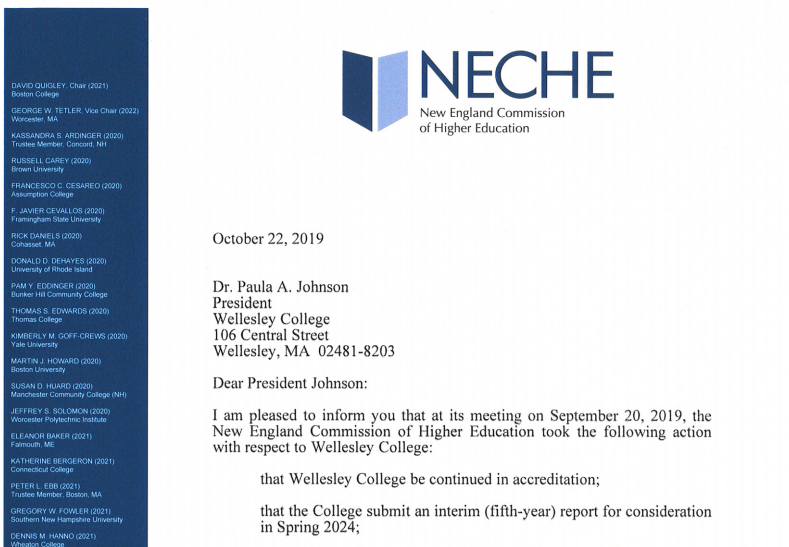On Nov. 1, the Wellesley community received a school wide email from President Paula A. Johnson announcing the College had been re-accredited by the New England Commission of Higher Education (NECHE).
Johnson’s statement reads in part, “This process, which began in March 2017, could not have happened without the leadership and hard work of many members of our community, in particular, a steering committee that included faculty, students and senior leadership who brought important perspectives that strengthened our work immeasurably.”
The NECHE evaluates the schools it is responsible for overseeing every ten years. During this accreditation cycle, Bryan Burns, a professor of classical studies and Pamela Taylor, the Assistant Provost of Institutional Planning and Assessment and Director of Institutional Research co-chaired the steering committee. The steering committee is a group of students, faculty and staff that are responsible for evaluating the school and writing the self-study required of NECHE for accreditation.
Taylor said in a written statement to the Wellesley News that “the accreditation steering committee spent two years gathering the data and information needed to describe and evaluate our current processes and identify those areas where we wanted to improve in the future. The accreditation self-study and the NECHE response are being used to inform Wellesley’s strategic planning process, so I know that this work will have long-lasting effects on the College.”
Burns told the Wellesley News that one of the challenges of leading the steering committee was writing about policies that were under submission at the time. “Because we spent over a year preparing a written report, and then the review process lasts over six more months, it was often challenging to write about policies [which] were under active discussion at the time – such as the grading policy or the multicultural requirement,” he said.
The steering committee asked for feedback from the greater Wellesley community when writing its self-study. An early draft of the self-study was open to members of the Wellesley community from Nov. 14 to Nov. 30 of 2018 for comment. Additionally, a Nov. 2018 email from President Johnson titled “College Announcement: Identifying Wellesley’s Institutional Values” announced that the steering committee has “identified a need to review, reconsider and hone the expressed values of Wellesley College.” Johnson attached a Google form to the email and asked members of the college community to answer the question, “What aspect of Wellesley has had the most powerful effect on you?” The email received a large response from the campus community, and helped inform the “Mission and Purposes” section of the self-study.
After reading the self-study and visiting Wellesley in March, NECHE produced a report and a response to the findings of the self-study and conversations they had with members of the college community. The response praised Wellesley for producing an excellent self-study as well as the College’s many accomplishments in the last decade, including completing “the largest fundraising campaign in the College’s history, ahead of schedule and ahead of its $500 million goal; completing campus renewal projects including renovations to residence halls, arts buildings and teaching spaces; launching new programs in public speaking and writing; and establishing the Albright Institute for Global Affairs and the Center for Career Education.” The response also commended Wellesley for its strong culture of faculty engagement, its history of approaching institutional challenged collectively and its dedication to providing students with a holistic experience.
NECHE asked Wellesley to submit an interim report on its progress in Spring of 2024, five years before the College is due for another re-accreditation. The NECHE said that Wellesley must focus on the following four areas moving forward: formulate a comprehensive strategic plan that includes campus renewal and financial stability, evaluate the effectiveness of academic institutional government structures, achieve student diversity goals and enhance the culture of assessment to examine student learning outcomes.
Burns says that it is “gratifying to see how the Commission has described the College’s strengths and encourages us to continue working on the big projects of improving facilities on campus and strengthening academic success for all students.”
The NCHE’s full response and report can be found on the accreditation section of Welesley’s website.






